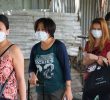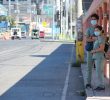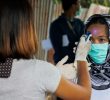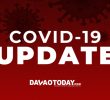DAVAO CITY, Philippines- The City Council of Davao passed an ordinance this week requiring all establishments in Davao City to implement the Safe Davao QR Code for the purpose of contact tracing of COVID-19 cases. Penalties are now imposed for establishments that fail to implement this system.
The ordinance was approved unanimously by the City Council on Tuesday, which was authored by Councilor Melchor Quitain, with the title An Ordinance Requiring the Mandatory Implementation of the Safe Davao QR for All Establishments and All Individuals, Including Non-Residents of Davao.
Under this ordinance, the mandatory scanning of DQR will be required to all offices and establishments.
Exempted in this system are establishments not inside an enclosed space or under structures within roof and walls such as stalls, ambulant vendors, lechon manok stand, sari-sari store, bakery, market stall and other similar establishments.
In the case of establishments with several stores or offices such as malls, hospitals, commercial complexes, the buildings, “In this case, individual stores and offices should be the establishment that will scan the DQR.”
Establishments or offices are also permitted to post their establishment DQR ready for scanning by an individual.
As the DQR scanning requires devices such as the DQR app that need to be online, the ordinance allows establishments to do offline scanning, provided they will upload the data the soonest time possible.
The City Government of Davao has reported over 37,900 business establishments registered in the city.
Before the council passed the ordinance, the strict implementation of the Safe Davao QR is already mandated by Mayor Sara Duterte-Carpio in her Executive Order No. 02 released on January 21 this year.
Penalties
In the ordinance, individuals who are found to violate the DQR code, such as forging or tampering, will be reprimanded on the first offense, and will face a penalty of a P500 fine or with community service on the second offense, and an amount of P1,000 or one month imprisonment or both for the third offense.
Public employees or officers will also face an administrative case for violations pursuant to the Local Government Code 1991 or the Civil Service Laws rules and regulations.”
For a violation committed by establishments, the ordinance states that the owner, general manager, or officer in charge of the establishment shall be liable for any violation of the ordinance.
The first offense will have them receive a written warning. For the second offense, they will be paying P5, 000 and/or suspension of business operations for thirty (30) days from the date of violation while for the third offense, a fine of P5, 000 and cancellation of business permit.
The Safe DQR Code was implemented last October with controversy. In its first month, the online DQR system crashed when hundreds and thousands of registrations were simultaneously done. (http://davaotoday.com/main/politics/registration-glitches-raise-anxiety-as-qr-code-implementation-nears/) Information technology experts also raised alarm over many safety issues on the system which were corrected later. (http://davaotoday.com/main/politics/has-safe-davao-qr-code-resolved-data-security-issues/)
Davao City has recorded 24,651 total cases of COVID-19 since the start of the pandemic, 4,627 of which are active cases while 19,150 have recovered and 874 have died.










